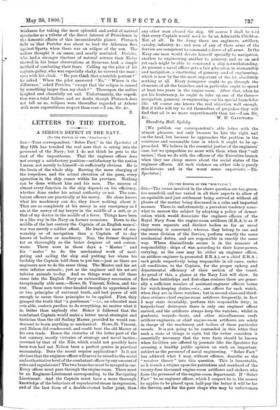LETTERS TO THE EDITOR.
A SERIOUS DEFECT IN THE NAVY.
[To THE EDITOR OF THE "SPECTATOR.']
Sin,—Your correspondent, "Sober Fact," in the Spectator of May 12th has touched the real sore that is eating into the
• personnel of the Navy; but I do not think he gets to the root of the imposthume. That the engineer officer does not occupy a satisfactory position—satisfactory to the nation I mean, not merely to himself—is sufficiently obvious. He is the brain of the whole ship. Barring the mere charging of the torpedoes, and the actual elevation of the guns, every operation in the ship comes within his province.. Nothing can be done without him and his men. The success of almost every function in - the ship depends on his efficiency, whether done under his actual authority or not. The com- batant officers are practically at his mercy. He alone knows what his machinery can do; they know nothing about it. _ They are as.completely at his mercy in any emergency as I am at the mercy of my lawyer in the middle of a suit, or at that of my doctor in the middle of a fever. Things have been in a like way in the Navy on former occasions.. Down to the middle of the last century the Captain of an English man-o% war was merely a soldier afloat. He knew no more of sea- manship or of navigation than a Captain of to - day knows of boilers or machinery. Nay, the former despised tar as thoroughly as the latter despises oil and cotton- waste. There were in those days a " Master " and his " mates " to do the mechanical work of navi- gating and sailing the ship and putting her where his lordship the Captain told them to put her,—just as there are engineers now to do the same thing. The Master and his set were inferior animals ; just as the engineer and his set are inferior animals to-day. And so things went on till there came into the English Navy an extraordinary succession of exceptionally able men,—Howe, St. Vincent, Nelson, and the rest. These men were clear-headed enough to apprehend one or two principles of universal truth, and had power of will enough to cause those principles to be applied. First, they grasped the truth that "a gentleman "—i.e., an educated man —is-able, caeteris paribus, to do everything, no matter what it is, better than anybody else. Hence it followed that the combatant Captain would make a better naval strategist and tactician than the old Sailing Master, provided he would con- descend to learn anything so mechanical. Howe, St. Vincent, and Nelson did condescend, and could beat the old Master at his own trade. Hence the victories of the latter part of the last century, mostly victories of strategy and naval tactics; crowned by that of the Nile, which could not possibly have been won had not Nelson been a perfect genius in practical seamanship. Does the moral require application? Is it not obvious that the engineer officer will never be raised to the social and authoritative level of the combatant officer by any amount of rules and regulations? The two branches must be merged in one. Every officer must pass through the engine-room. There must be an Engineer-Lieutenant corresponding to the Navigating Lieutenant. And the Captain must have a more thorough knowledge of the behaviour of superheated steam in expansion, and of the best form of a double-riveted boiler joint, than any other man aboard the ship. Of course I shall be told that every Captain would need- to be an Admirable Crichton. Not at all. In the Army there are engineers, artillery, cavalry, infantry; &c., and men of any of these arms of the Service are-competent to command a force of all arms. In the Navy one man would devote himself specially to navigation, another to engineering, another to gunnery, and so on, and yet each might be able to command a ship notwithstanding. At present a naval officer gets a fair education in seamanship and navigation, a smattering of gunnery, and of engineering, which is now by far the most important of the lot, absolutely nothing at all. Every youngster ought to go through the elements of all the branches, and in particular ought to spend at least two years in the engine-room. After that, when he got his lieutenancy, he ought to take up one of the three— navigation, gunnery, or engineering—as his special branch for life. Of course one knows the real objection well enough. But if folks will try to rid themselves of prejudice they will find that oil is no more ungentlemanly than tar.—I am, Sir,
Skendleby Hall, Spilsby.
W. D. GATNSFORD.
[We publish our correspondent's able letter with the utmost pleasure, not only because he hits the right nail on the head, but because he approaches the problem in the courteous and reasonable tone in which it ought to be ap- proached. We believe in the essential justice of the engineers' case, but We sympathise no more with them when they "call names," than we do with the officers of the Executive branch when they use cheap sneers about the social status of the engineer officers. All such violence on either side is purely mischievous and in' the worst sense unpatriotic.—En. Spectator.]






































 Previous page
Previous page